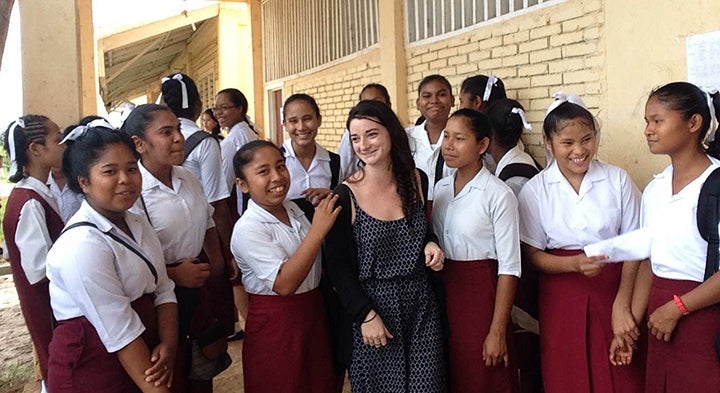KINGSTON, R.I. – June 16, 2016 – A 2015 graduate of the University of Rhode Island has been awarded a prestigious post-baccalaureate fellowship from the National Institutes of Health to study the effects of drug abuse on the brain. Bailey Mallon, a native of Wakefield who earned degrees in cell and molecular biology and biological sciences, will begin her fellowship at the National Institute of Drug Abuse in August.
“To be truthful, I didn’t think I would get the position because competition against other unknown candidates can be so intimidating,” said Mallon. “But it doesn’t hurt to apply, and after the encouragement I received from family and URI faculty, I felt pretty good about my application.”
During her two years at the institute, Mallon will conduct research on how addiction alters brain function and its capacity to manage normal behavior, emotional reactions and cognitive processes.
The fellowship program is designed to provide recent college graduates opportunities to conduct biomedical research in anticipation of entering graduate school. This is the third year in a row that a URI graduate has been awarded the fellowship.
“It’s a great opportunity to pave the way for an excellent skill base that young scientists need for graduate school entry,” Mallon said.
Mallon hasn’t had much time to relax since graduating a year ago. She is nearing the end of a challenging year of teaching biology, chemistry, physics and technology to impoverished students in Guyana through the World Teach Organization.
“Experiencing third world poverty and its corresponding educational system is eye-opening but exhausting,” she said. “Every time you take a step forward, you end up taking several steps backward. The corruption in the school system and lack of resources make it hard to navigate through.”
Despite the hardships, Mallon said the experience has been positive.
“Keeping these kids interested is my biggest challenge, especially when some of them live three hours away – they take a river boat each morning and then walk an hour to get to school,” she said. “With students like these, a teacher needs to be animated, intriguing and motivating to keep them coming to school and to prevent them from dropping out.
”But my most frustrating and challenging experiences here are, at the end of it all, the most enjoyable. When a lesson of mine leads into classroom discussion with all participating, I know I have done my job right, if only for that small moment,” Mallon added. “Or when I find notes that my students leave me on my desk explaining how much I’ve inspired them. I can’t change the system, but I can help make a difference for a few students.”
She has learned firsthand about the poor health care available in the rainforest community in which she lives and works – the hospital has no soap and the nurses don’t wear gloves or sterilize instruments – and yet she is still not discouraged.
“With no access to anything that’s standard procedure back home, you’re left to your own devices,” Mallon said. “So as much as these experiences might feel bad in the present moment, they are awesome experiences looking back on it all.”
With just weeks to go before returning home from Guyana, Mallon is looking forward to her NIH fellowship and a future career in neuroscience.
“I’m intrigued by how chemical concentrations in the brain dictate emotional states of mind and cognitive processing,” she said. “Ingestion of certain substances, like recreational drugs, can change someone’s personality, at least for a little bit.
“Which brings us to the philosophical question: Are we in control of our personalities and consciousness, or are we simply under that impression while the chemicals and neurotransmitters control our personalities? And what really is consciousness, if it can be altered through ingestion of different substances? These are questions I want to investigate in my career,” said Mallon.

